“Tripoli Two” reveal faces
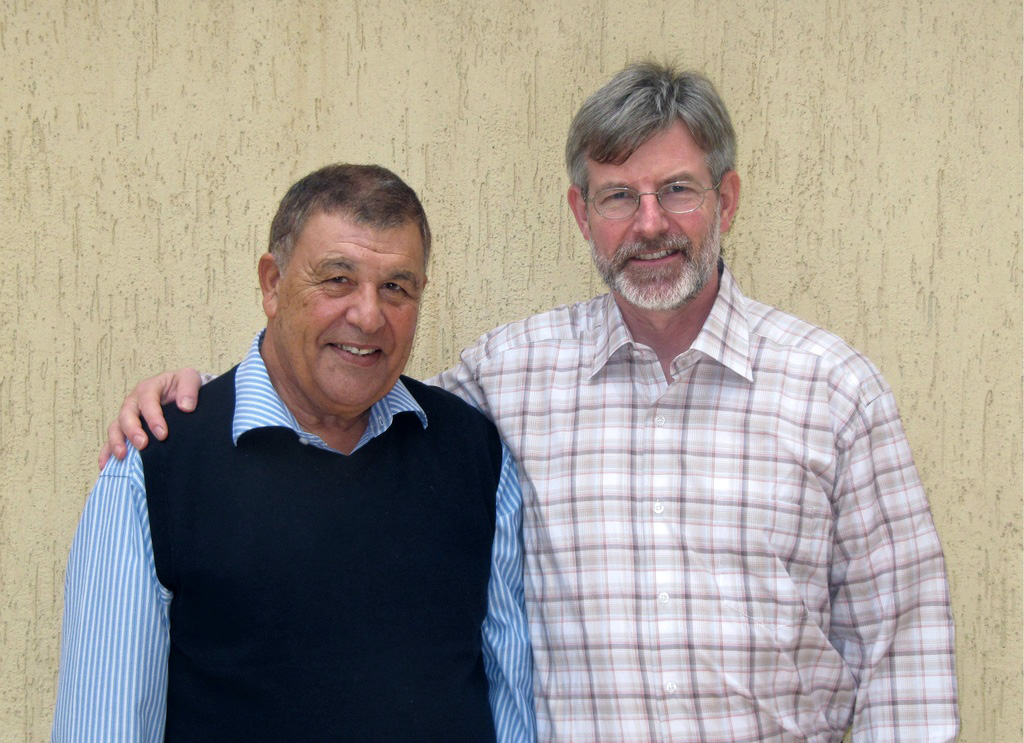
Rachid Hamdani and Max Göldi, the two Swiss businessmen detained in Libya since July 2008, have released a photo to thank people in Switzerland for their support.
But while Amnesty International, which has organised an online campaign for the men, says solidarity is important, a psychologist says such photos could be counterproductive.
“More than 10,000 people have signed the campaign. Half have also sent a message to Max and Rachid, hoping they’ll be able to spend Christmas with their families and so on,” Manon Schick from Amnesty’s Swiss section told swissinfo.ch.
“They can read these messages from the embassy in Tripoli – everyone can – and they said it’s been very helpful to see such a big movement of solidarity in Switzerland.”
Hamdani and Göldi were sentenced to 16 months in prison by a Libyan court on December 2 for visa irregularities and tax evasion.
Their plight has become the most visible sign of a dispute that stems from the 2008 arrest in Geneva of a son of Libyan leader Moammar Gaddafi on charges, later dropped, of mistreating two domestic employees.
Swiss President Hans-Rudolf Merz went to Tripoli in August 2009 and apologised for the arrest, triggering heavy criticism at home for doing so.
Gratitude
But why release the photo now? Wouldn’t it have been more effective earlier?
“At first Göldi’s family didn’t want to release his picture. But last Friday, when we were distributing postcards in Bern with his two brothers, a lot of media asked why they didn’t release a photo. So they spoke to him and at first he said no, but after this echo of solidarity he agreed and said he wanted to have a picture with Rachid and show his face as a sign of gratitude.”
In the photo Göldi and Hamdani both look healthy, happy and, under the circumstances, relatively positive. This makes a change from the typical desperate and hopeless-looking “hostage shot”.
“They chose this picture because it shows them looking grateful and with a lot of hope – not defeated and sad,” Schick said.
“We didn’t tell them it’s better if you look sad because it will move people in Switzerland. It’s their choice and I can respect it – they want to say thank you.”
Effective?
Regarding the effectiveness of such photos, she added that this was a “special situation” where the hostages had the opportunity to take a picture.
“On many occasions we don’t have pictures. I remember a campaign we did with a journalist in Ethiopia. We had a very bad picture sent by her family – an out-of-focus black-and-white passport photo – and it was quite difficult to get people to sign for her liberation because she didn’t look very friendly!” she said.
“When she was released, she realised how important it was to be in a picture. A face is obviously more moving than a name.”
As for official involvement, Hamdani’s wife said the two hostages didn’t ask the Swiss government about publishing their picture.
“I don’t think it was a problem for the Swiss government to show the faces. At first it was the families who said ‘look, when they come back to Switzerland it would be very difficult if everybody recognises them in the street’,” Schick said.
“You can say that after two months, but after 16 months – when they have just been sentenced to another 16 months – you have to mobilise energies and solidarity, because it won’t be possible to solve the problem now without a lot of pressure.”
Criticism
Judith Barben, a psychologist and author of “Spin Doctors in Parliament: Endangering direct democracy by manipulation and propaganda”, disagrees.
“I think the whole affair of the hostages in Libya is used by the media – internationally and within Switzerland – to denigrate the reputation of Switzerland and especially Swiss President Hans-Rudolf Merz,” Barben told swissinfo.ch.
“I think it’s part of a kind of psychological operation to undermine the Swiss model of direct democracy.”
She pointed to an interview given by Merz on Swiss radio in which he said he had received many letters of support [for flying to Tripoli] but that there was basically a media campaign to destroy him and make him resign.
Barben described the release of the photograph as “futile and maybe counterproductive”.
“I think it’s no help – why don’t you leave [the hostage situation] to the diplomats? There are enough people trying to secure the hostages’ release. I think Amnesty International is no longer necessary,” she said.
“And the happy faces are not helpful either, because they seem not to be in urgent need of help.”
Thomas Stephens, swissinfo.ch
July 15, 2008: Hannibal Gaddafi and his wife Aline are arrested at a Geneva hotel after reports that they have mistreated two servants. After two nights in detention, the couple are charged with inflicting physical injuries against the servants. The Gaddafis are released on bail and leave Switzerland.
July: Two Swiss nationals are arrested in Libya. Swiss businesses are forced to close their offices and the number of Swiss flights to Tripoli is cut. Bern sends a delegation to Libya.
January 2009: Talks are held in Davos with Seif al-Islam Gaddafi, one of the Libyan ruler’s sons. A diplomatic delegation travels to Tripoli.
April: Hannibal and his wife, along with the Libyan state, file a civil lawsuit against the Geneva authorities in a Geneva court.
May: Foreign Minister Micheline Calmy-Rey visits Libya, reporting “significant progress”.
June: Libya withdraws most of its assets from Swiss bank accounts.
August: Merz, who meets the Libyan prime minister but not Gaddafi, apologises in Tripoli for the arrest. Swiss appoint arbitrator for international tribunal.
September: Libya does not let the two Swiss nationals leave the country, breaking a promise made to Merz that they would be free to return to Switzerland before September 1. Libya names its representative for the tribunal. Gaddafi and Merz meet on the sidelines of the UN General Assembly in New York. The two nationals disappear after undergoing a medical check-up in Tripoli.
October: A Swiss delegation returns empty-handed from Tripoli. A 60-day limit for normalising relations between Switzerland and Libya passes with no sign of the two Swiss hostages held by Tripoli. The Swiss cabinet expresses irritation over Libya’s “systematic refusal” to implement agreements between the two countries.
November: Swiss ministers suspend treaty seeking to normalise relations with Tripoli and say they will pursue visa restrictions for Libyans.
December: Two businessmen allegedly sentenced to 16 months in prison and fined SFr1,600.

In compliance with the JTI standards
More: SWI swissinfo.ch certified by the Journalism Trust Initiative

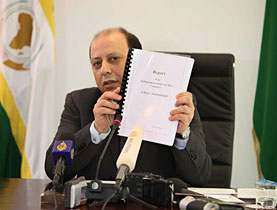
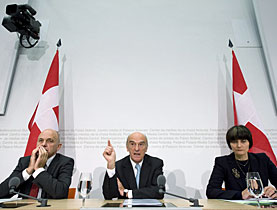
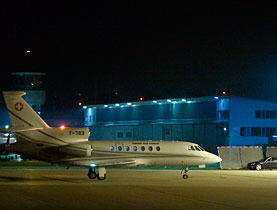
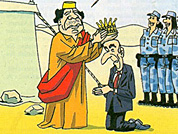
You can find an overview of ongoing debates with our journalists here . Please join us!
If you want to start a conversation about a topic raised in this article or want to report factual errors, email us at english@swissinfo.ch.